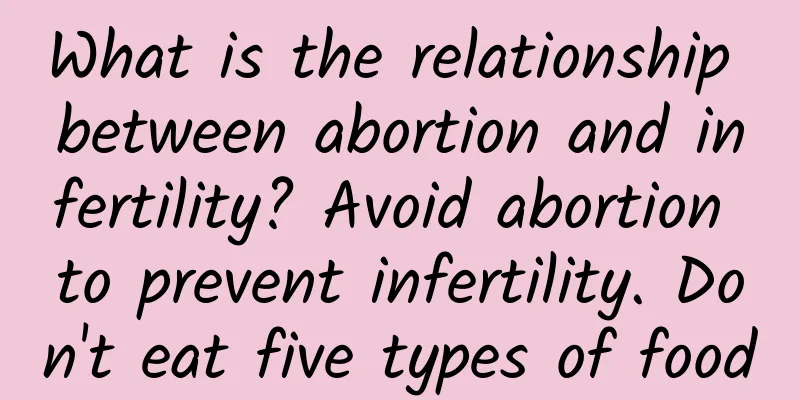What is the relationship between abortion and infertility? Avoid abortion to prevent infertility. Don't eat five types of food

|
Data released by the National Population and Family Planning Commission's Institute of Science and Technology show that about 10 million people undergo artificial abortions in my country each year, with 62% of them being women of childbearing age aged 20-29. The rate of repeated abortions in most unmarried women is greater than 50% within a year. The damage caused by these artificial abortions may cause them to lose their ability to bear children. How to reduce the growing rate of artificial abortions has become a public health issue. Nearly 90% of infertile women have a history of artificial abortion "I prefer to believe the figure of 13 million. The statistic of 10 million does not include the figures of medical abortion and artificial abortion in unregistered private clinics." Professor Wu Shangchun of the National Health and Family Planning Commission's Institute of Science and Technology mentioned that according to data released by the National Population and Family Planning Commission's Institute of Science and Technology, about 10 million people in my country have artificial abortions every year, of which 62% are women of childbearing age aged 20-29, and the rate of repeated abortion is as high as 55.9%. Li Xiaoshuan, deputy chief physician of the Department of Obstetrics and Gynecology of the Ninth Hospital of Xi'an, said that the probability of abortion complications and sequelae is higher when the number of artificial abortions is high and the time interval is short (repeated artificial abortions within a year, especially within 6 months), and it greatly increases the probability of female infertility. 7 reasons for female infertility Sexually transmitted diseases infertility: diseases transmitted by sexual intercourse are collectively referred to as diseases, including gonorrhea, syphilis, chlamydia infection, mycoplasma infection and toxoplasmosis infection, etc. Some of these diseases can cause fallopian tube obstruction, some cause endometritis, uterine muscle wall damage, endocrine dysfunction, etc., leading to infertility; some cause damage to important organs and endanger life; some can cause miscarriage, premature birth or stillbirth during pregnancy. Endocrine disorder infertility: Ovulation disorders and ovulation induction treatment: The establishment of a normal ovulation cycle requires normal function of the hypothalamus-pituitary-ovarian axis. Dysfunction of any of these parts may lead to anovulation, thus causing amenorrhea, oligomenorrhea, functional uterine bleeding, etc., leading to infertility. Ovarian infertility: The ovaries are reproductive glands. During the reproductive age, the ovaries are 2.5 to 5.0 cm long, 1.5 to 3.0 cm wide, and 0.6 to 1.5 cm thick. Normally, the ovaries are located in the ovarian fossa. The main function of the ovaries is to produce and discharge eggs and secrete steroid hormones. If the ovaries are underdeveloped, dysfunctional, or have tumors, they will affect human development, health, and fertility. Tubal infertility: Tubal inflammation is a common gynecological disease and one of the main causes of female infertility. In recent years, the incidence of infertility caused by sexually transmitted diseases (STDs) such as gonococcal and Chlamydia trachomatis tubal inflammation has been increasing significantly. Prevention and treatment of reproductive tract infections is crucial to infertility. Vulvar and vaginal infertility: Infertility caused by vulvar and vaginal diseases accounts for 1% to 5% of infertility. The vagina is a receptor for sexual life and semen. Certain vulvar and vaginal organic or functional diseases affect the entry and storage of semen or sperm into the vagina, or the changes in the environment affect the function of normal sperm, resulting in infertility. Uterine and cervical infertility: Uterine malformation, dysplasia, endometritis, cervicitis, abnormal uterine position and endometrial dysfunction directly affect whether a considerable number of sperm can swim into the uterine cavity to be capacitated. Cervical organic or functional diseases affect the entry and storage of semen or sperm in the cervical canal. The cervix is the first barrier for sperm to pass through. Any changes in its anatomy and physiology can affect the passage of sperm and cause female infertility. Endometriosis infertility: Endometriosis is a gynecological disease caused by the growth of endometrium in any part of the body outside the uterine cavity. For example, it can occur in the ovaries, uterosacral ligaments, the posterior wall serosal layer of the lower uterine segment, the rectouterine pouch, and the pelvic peritoneum of the sigmoid colon. It can also occur in the myometrium. Therefore, endometriosis is clinically divided into extrinsic endometriosis and intrinsic endometriosis. Patients often complain of infertility, dysmenorrhea, and pelvic pain. Domestic and foreign reports show that the infertility rate of patients with endometriosis is about 40%. Avoid eating five types of food to prevent infertility (1) Coffee: Researchers from the National Institute of Environmental Health Sciences in the United States conducted a study on 104 women who wanted to get pregnant and concluded that coffee has a direct impact on conception. Among these women, those who drank more than one cup of coffee a day were half as likely to get pregnant as those who did not drink this beverage. Therefore, they suggested that women should drink less coffee if they want to get pregnant. (2) Carrots: Carrots are rich in carotene, multiple vitamins, and other nutrients that are beneficial to the human body. Gynecological experts at Rothgis Medical Center in New Jersey, USA, found that if women eat too much carrots, the large amount of carrots they consume will cause amenorrhea and inhibit the normal ovulation function of the ovaries. (3) Sunflower seeds: The protein content of sunflower seeds contains testicular inhibitory components, which can cause testicular atrophy and affect normal reproductive function. Therefore, young people of childbearing age should not eat too much. (4) Alcohol: Scientific research has shown that ethanol, the main component of alcohol, can increase the concentration of catecholamines in the body, cause vascular spasms, testicular dysplasia, and even testicular atrophy. The spermatogenesis function will undergo structural changes, and the secretion of testosterone and other male hormones will be insufficient, resulting in feminine manifestations such as a thinner voice and enlarged breasts. Such people are prone to male infertility, and even if they give birth, the next generation is more likely to be deformed. For women, it can cause irregular menstruation, amenorrhea, egg production mutations, loss of sexual desire, or cessation of ovulation. (5) Garlic: Eating too much garlic can suppress one’s vital energy and has a significant effect of killing sperm. If young people of childbearing age consume too much garlic, it will have an adverse effect on fertility, so it is not advisable to eat too much garlic. |
<<: What are the harms of abortion for women? How to nourish women after abortion?
Recommend
Experts will explain to you the symptoms of secondary dysmenorrhea
It is necessary for everyone to understand the sy...
Menstrual cramp-like pain in lower body
The cramp-like pain in the lower body during mens...
Uterine fibroids generally present with more symptoms such as abdominal masses
Uterine fibroids usually present with abdominal l...
Things to note when treating dysmenorrhea
According to relevant statistics, more than 90% o...
How to prevent vaginitis in daily life
What should you do if you have vaginitis? How to ...
Does adnexitis affect fertility?
Does adnexitis affect fertility? Generally speaki...
What are the characteristics of cervical warts?
What are the characteristics of cervical warts? S...
What harm does cervical erosion cause to women? What are the dietary taboos for patients with cervical erosion?
1. Leading to infertility. When cervicitis occurs...
Why does menstruation come again and again?
Why does menstruation come again and again? Menst...
Can I have sex on the first day of my period? No!
Although the amount of menstrual blood is relativ...
Does ovarian cyst require surgery to get pregnant?
Does ovarian cyst require surgery before pregnanc...
Etiology of congenital absence of vagina
Congenital absence of vagina is often accompanied...
Some precautions for painless abortion
Do you know what are the precautions for painless...
What is the best way to treat habitual miscarriage?
Once diagnosed with habitual abortion, patients c...
What to eat for less menstrual flow
What should I eat when my menstrual flow is light...




![[Video version] The key to weight loss: ignite your metabolism and avoid these 5 landmine foods](/upload/images/67dcfca95aa36.webp)




